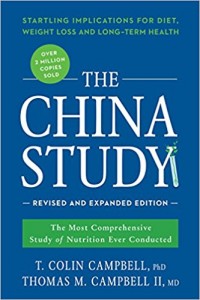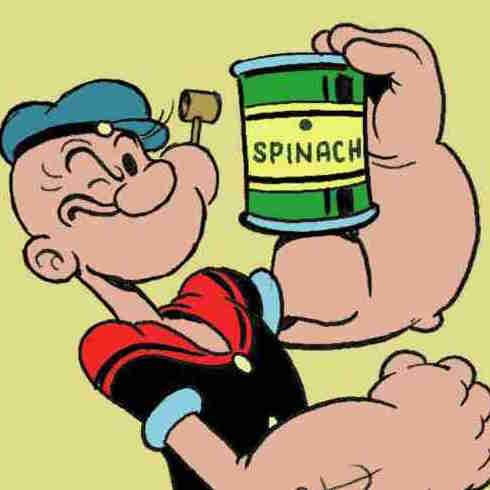The China Study | Part II
She just seemed weird
First of all, she was a vegetarian. That always seemed a little “off” to me because, oftentimes, that dietary regimen always seemed to be accompanied with some eccentricities that, as a whole, just seemed weird. In this case, she used organic deodorant as well as organic toothpaste…
Now, while I never asked her about her rationale, I’m sure she could’ve elaborated on all kinds of health concerns and environmental factors, but the fact of the matter was, she was very pale and – not just skinny – she was frail looking. In other words, she just seemed weird.
Fast forward several years later
While I’m not reevaluating my deodorant or toothpaste, I do have a much different approach to an all plant diet. Granted, while my openmindedness is inspired in part by some fitness goals, the substance that characterizes the argument in favor of a diet that avoids any kind of dairy or animal based protein sources is downright compelling.
One thing that should be stated up front, however, is that it can be very difficult to “hear” the voice of sound science above the din of marketing campaigns, cultural norms and a business landscape that is focused more on what influences the consumer than what actually benefits the consumer. How does one distinguish the difference between the source that’s offering you a comprehensive, full color portrait as opposed to the one that’s giving you a judiciously positioned black and white snapshot?
I’ve decided that if I can corroborate what’s being presented with other credible sources that aren’t necessarily fitness related…
…and if what I’m hearing runs contrary to what makes sense if your desire is to make money by promoting industrial preferences…
…then, I’m going to listen.
One of the oldest “books” around
That said, it says in Genesis 1:29 that when God first put humanity on the map, it was fruits and vegetables on the menu and that was it (Gen 1:29). Meat would become a part of the picture later (Gen 9:3), but, from the standpoint of one of the oldest texts we have available to us, fruits and vegetables are mentioned very prominently, if not exclusively, as far as what’s going to work best with the way our bodies are wired.
So, there’s that.
Then you’ve got the tension that invariably exists when you publish facts that fly in the face of conventional medicine and big money food manufacturers. There is a place for surgery just as there is a place for good tasting food. But you don’t want to rely on surgery to repair what should be remedied with a change in your lifestyle and you don’t want to structure your diet around items that should be embraced as occasional treats as opposed to standard meals.
So, when you’ve got a team of scientists that are appropriately guarded in the way they conduct their research knowing that their findings, however conclusive they may be, are still not especially welcome in some circles – it they’re still bold enough to publish their findings – that makes them all the more credible in my mind because they’re not benefiting themselves at all by criticizing a paradigm that is both traditional and lucrative.
The Bottom Line
The bottom line is you can treat, prevent and even reverse a number of diseases that are traditionally categorized as ailments that can only be addressed in the context of pharmaceuticals and surgery. And while it might seem that you have to be fairly detailed in your choice of fruits and vegetables in order to get the full protein profile along with all the nutrients you need, you don’t. It’s really pretty easy and by eating a plant based diet, you’re getting everything you need in a manner is absorbed by your body without any of the health threatening side effects that accompany the kind of nutrition provided by animal products.
Take a look at the following chart1:
| NUTRIENT COMPOSITION OF PLANT AND ANIMAL-BASED FOODS (per 500 calories of energy) | ||
| Nutrient | Plant-Based Foods | Animal Based Foods |
| Cholesterol (mg) | – | 137 |
| Fat (g) | 4 | 36 |
| Protein (g) | 33 | 34 |
| Beta-carotene (mcg) | 29,919 | 17 |
| Dietary Fiber (g) | 31 | – |
| Vitamin C (mg) | 293 | 4 |
| Folate (mcg) | 1168 | 19 |
| Vitamin E (mg_ATE) | 11 | 0.5 |
| Iron (mg) | 20 | 2 |
| Magnesium (mg) | 548 | 51 |
| Calcium (mg) | 545 | 252 |
| *Equal parts of tomatoes, spinach, lima beans, peas and potatoes **Equal parts of beef, pork, chicken and whole milk |
||
Color me weird…
In “The China Study,” Dr. Campbell cites some pretty sobering statistics. He says…
If you are an American male, you have a 47% chance of getting cancer. If you’re an American woman, you have a 38% chance of contracting the disease. In addition, as a nation, we are fast becoming the most obese nation on planet earth with overweight Americans now outnumbering those who maintain a healthy weight. According to the National Center for Health Statistics, almost a third of adults 20 years or older are obese. “One is considered obese if they’re carrying more than a third of a person above and beyond a healthy weight.”2
And then he goes on to say…
Additionally, impressive evidence now exists that show that advanced heart disease, relatively advanced cancers of certain types, diabetes and a few other degenerative diseases can be reversed by diet. I remember when my superiors were only reluctantly accepting the evidence of nutrition being able to prevent heart disease, for example, but vehemently denying its ability to reverse such a disease that’s already advanced. But the evidence can no longer be ignored. Those in science or medicine who shut their minds to such an idea are being more than stubborn; they are being irresponsible. 3
The woman I referenced as being “weird,” was a little “different” in the way she approached certain things. But I’m convinced that her approach to a plant based diet was absolutely on point. So, should someone look at me and wonder if my eating beans and nuts for my protein source instead of eggs and meat seems, “off…”
Well, color me “weird” too!
China Study | Part I <- -> China Study | Part III
1. “The China Study”, T. Colin Campbell, PhD, Thomas M. Campbell II, MD, BenBella Books Inc, Dallas TX, p224
2. Ibid, p4
3. Ibid, p16-17










Leave a Reply
Want to join the discussion?Feel free to contribute!